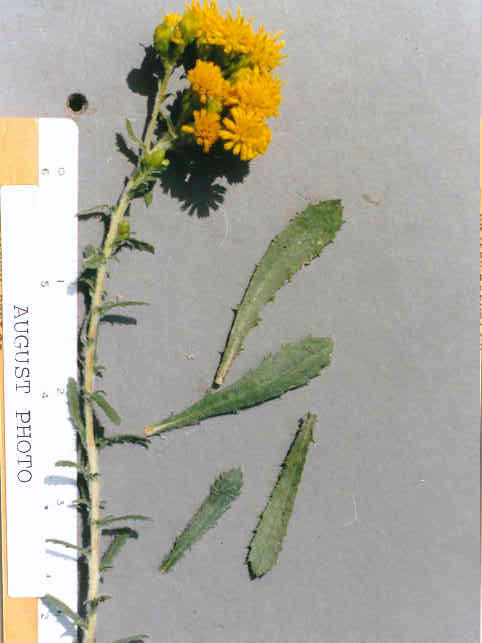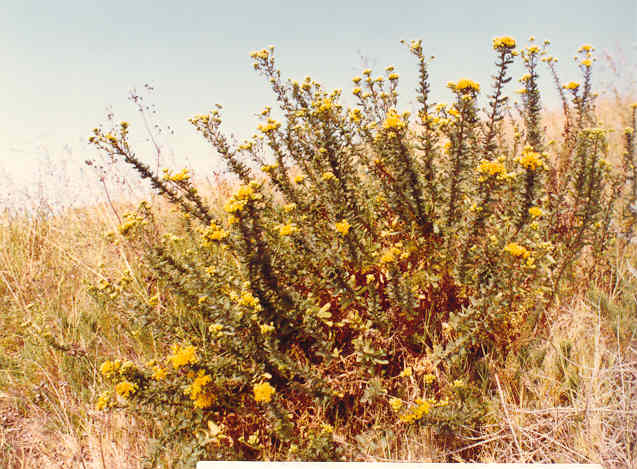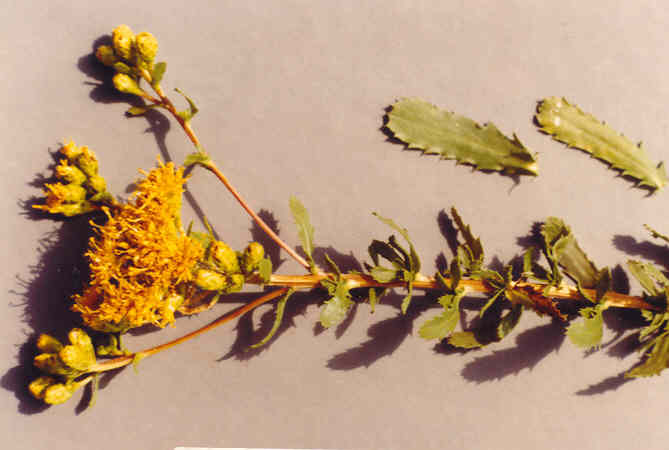
Isocoma
menziesii var. vernonioides Nutt.
=Isocoma
veneta var. vernonioides
=Haplopappus
venetus ssp. vernonioides
 |
Isocoma
menziesii var. vernonioides Nutt.
=Isocoma
veneta var. vernonioides
=Haplopappus
venetus ssp. vernonioides
Asteraceae (Sunflower Family)NativeCoastal GoldenbushRabbit BrushCoastal IsocomaCommon Hazardia |
August Photo
Plant
Characteristics:
Perennial, 4-12 dm. high, the stems erect or decumbent, branched from the
base, usually simple below the infl.; lvs. clustered in axils, often so dense as
to obscure the stem, not fleshy, spatulate-oblong, 1-3 cm. long, 3-8 mm. wide.
spinulose-dentate to almost lobed; heads in rounded, compact, terminal cymes;
invol. 5-7 mm. high, the phyllaries 20-40 in 3-6 series, with green acutish
tips.
Habitat: Common on dry slopes
below 1200 ft.; Coastal Strand, Coastal Sage Scrub, Coastal Salt Marsh; San
Diego n. to cent. Calif., Channel Ids. April-Dec.
Name: Greek, haploos, simple and pappos,
pappus. (Munz, Flora So. Calif. 174). Latin,
vena, a vein.
(Jaeger 279). Possibly refers to the prominent midrib of the leaves.
Vernonioides, like Vernonia,
a genus of tropical shrubs in Asteraceae. (John
Johnson). Archibald Menzies,
(1754-1842). Surgeon and naturalist to Vancouver's Pacific Coast expedition. Name commemorated in the dainty western plant called Baby
Blue Eyes (Nemophila menziesii) and
the plant genus Menziesia.
(Jaeger 313).
General: Very common in the
study area. Photos were taken on a shaded bank at the big bend in Back Bay Dr.
above the old salt works dike, the North Star Flats and along Back Bay Dr.
between the Newporter and San Joaquin Hills Dr.
(my comments).
The common name, Hazardia, goes back to a former genus name of these plants.
(Dale 65). A portion of the
genus Haplopappus was previously
called Ericameria but apparently not
this species. (my comment).
H. venetus has been found to accumulate free nitrates in quantities
capable of causing death or distress in cattle. (Fuller 374).
Delfina Cuero, a Kumeyaay or Southern Diegueno Indian, made the following
comment about Isocoma menziesii in her
autobiography: "Dry stalks
were used for brooms". (Shipek
91).
Text Ref: Abrams, Vol. IV
284; Hickman, Ed. 295, 1329; Munz, Calif.
Flora 1180; Munz, Flora So. Calif.
181; Roberts 12.
Photo Ref: Dec
3 82 # 3,22; July 2 83 # 2,3.
Identity: by R. De Ruff, confirmed by F. Roberts.
First Found: December 1982.
Computer Ref: Plant Data 179.
Have plant specimen.
Last edit 5/8/05.
 |
 |
July Photo July Photo